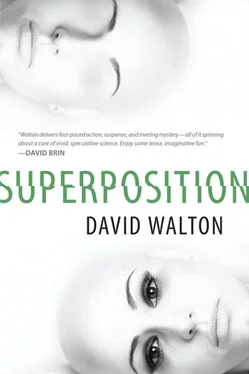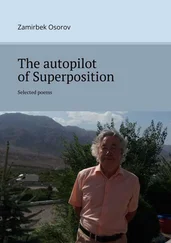But it didn’t matter how she had done it. What mattered was that I was stuck in here while a murderer ran free and my family was in danger. Tomorrow the jury would deliver a verdict. I was pretty sure that verdict was not going to be in my favor, which meant that this was my last night in this temporary holding cell. Tomorrow I would be moved to whatever maximum security prison they reserved for murderers, which I might never leave again.
It was only then that I remembered the sheaf of papers Terry had given me. I started paging through them lethargically, not sure what I was supposed to learn. He had said my double told me to read it carefully, but I wasn’t sure what I could find that would matter at this point. Why didn’t he just tell me what he wanted me to find instead of hiding it in a mountain of thick legal documents? I was feeling abandoned and sorry for myself. If there had to be two of me, why couldn’t I have been the one on the outside instead of the one stuck in jail?
My mind wandered as I flipped pages. Peyton had described the ghost woman he saw as ethereal and thin, but he admitted that the street lights had been mostly behind her, putting her in silhouette. Peyton’s description of the ghost’s disappearance—and the fact that she hadn’t left any footprints—certainly suggested a varcolac. Was it a female varcolac? Or the same varcolac manifesting a different parody of a human body? If so, why had no one else seen it? Why was it there? Peyton’s story provided more information, but instead of shedding any light on the overall mystery, it just made it more opaque.
Finally, I reached a page that was a little bit thicker than the others. The text was just another unintelligible legal case document, but I could tell from the thickness and texture that it didn’t belong. I ran a finger across it, and the legal text disappeared. Smartpaper.
It wasn’t illegal for prisoners to have smartpaper, so at first I wondered why my double had gone to the trouble of concealing it. Then I realized what it must be. A copy of the Higgs projector. My double must have come to the same conclusion I had—that the jury was unlikely to find me innocent of the charges. If I wanted to get out of prison, I would have to accomplish it another way.
When the lights dimmed on the cell block at nine o’clock, I climbed into my bunk, but I didn’t sleep. Using my body to block what I was doing from casual view of any guards that might walk by, I experimented with the Higgs projector, figuring out what it could do. I didn’t have much time. I had to act that night, while I still could.
It wouldn’t be easy. The walls of my cell were metal, and beyond them were other cells. There were armed guards and locked gates and video cameras and fences with razor wire. I waited until the midnight shift change, wanting to act during that confusion, however slight an advantage that might give. I stood right next to the door of my cell, watching. Prison is a predictable place, with strict schedules and discipline. The advantage to the guards is that it reduces stress and complaints and fights among the inmates. The advantage to me was that I could know exactly what would be happening at any given time.
I held the Higgs projector against the door. It had an electromagnetic lock, not a mechanical one, controlled from a central switchboard in the guards’ room. In general, this type of lock was more secure, because it was immune to picking. But magnetism, however strong, was driven by the exchange of subatomic particles. I ran a small subroutine I had discovered during my experimentation and heard a satisfying click. The door drifted subtly ajar.
I couldn’t turn invisible or walk through metal bars or teleport outside the prison. What I could do wasn’t much, considering, but I hoped it would be enough.
“Hey!” I shouted. “Hey!” I banged on the bars. “Guard!”
The guard was a big white man gone to fat, and not the most conscientious of the staff. His name was Leary, or Leavy, or something like that. He came lumbering over with a sour expression on his face. “What’s the problem, Kelley?”
I pushed the door open, showing him. “Some idiot forgot to lock my door,” I said. “I’m getting out of here tomorrow; I don’t want any trouble on my last day.”
Leavy’s face went from annoyed to astonished in a moment. He slammed the door in my face and rattled it to make sure it was secure. “Musta left it a little open,” he muttered.
“What, no thanks?” I shouted at his receding back. “I’m going to tell the shift manager how ungrateful you were!”
I hoped that would be enough incentive to make him report the incident, or better yet, to go find a maintenance guy to check the door, so he could pass off the problem to someone else and still be able to say he’d done everything he could. Regardless, though, I had to act now. I popped the lock again.
This time, however, I walked straight out and over to the next cell. I popped that lock, too, and opened the door. “Time to party,” I said. I didn’t wait for a response. I ran from cell to cell, unlocking them all and swinging open the doors. These weren’t hardened criminals; most were either awaiting trial or in for less than five years. Being caught trying to escape would add a lot of time to their sentences. For many of them, it wasn’t worth the risk, and they stayed in their cells, or shouted at me to get back in mine before I got somebody shot. There were enough mischief-makers, however, glad for a chance at freedom, or even just to relieve some boredom and cause some trouble, that the block was soon full of prisoners. My ruse had already gone unnoticed much longer than I’d been expecting, so when a siren started wailing, I wasn’t surprised.
“Let’s go!” I shouted. The door to the cell block was also electromagnetic, so I popped it and held it open while the others rushed through, yelling and whooping war cries. Once they were all out, I quietly walked back to my cell and shut the door.
It took the prison guards almost an hour to round up all the escaped inmates. A few of them had been pepper sprayed, a few were bruised or bloody, but nobody had been shot, and nobody had actually escaped. Before they could figure out who to blame, however, they needed to find another place for the prisoners on my cell block. They couldn’t very well leave us where we were, since there was clearly something defective with the locking system. I only hoped they did so before anyone studied the security cameras too closely and saw what I had done. The place was in chaos, with Leavy pompously telling anyone who would listen how he had followed the proper procedures.
The problem was, the prison was already overcrowded. They couldn’t just move us to another wing, because the other wings were all crowded, too. In fact, prisoners were sleeping in the gymnasium and on the floor in classrooms, since the dormitories weren’t large enough to house the population. It was a statewide problem, and the prisons didn’t have the budget to build new wings. I thought I knew where they would put us. In fact, I was counting on it.
After another half-hour of deliberation and several arguments between angry officials, they made the decision I’d been waiting for. They decided to house us in the temporary modular jails they had just had shipped in. The new jails were like trailers—mobile plug-and-play units that were apparently a lot cheaper than permanent structures. They were completed and supposedly secure, but had not yet been officially approved by the security committee. Best of all, they stood at the very edge of the prison compound.
The decision was made. We were shackled, shouted at, and told to leave our personal belongings behind, since we’d be returning to our usual cells the next day, once they sorted out the lock problems. Some of the prisoners, still riled from the near-escape, gave some trouble, but I went along meekly.
Читать дальше












